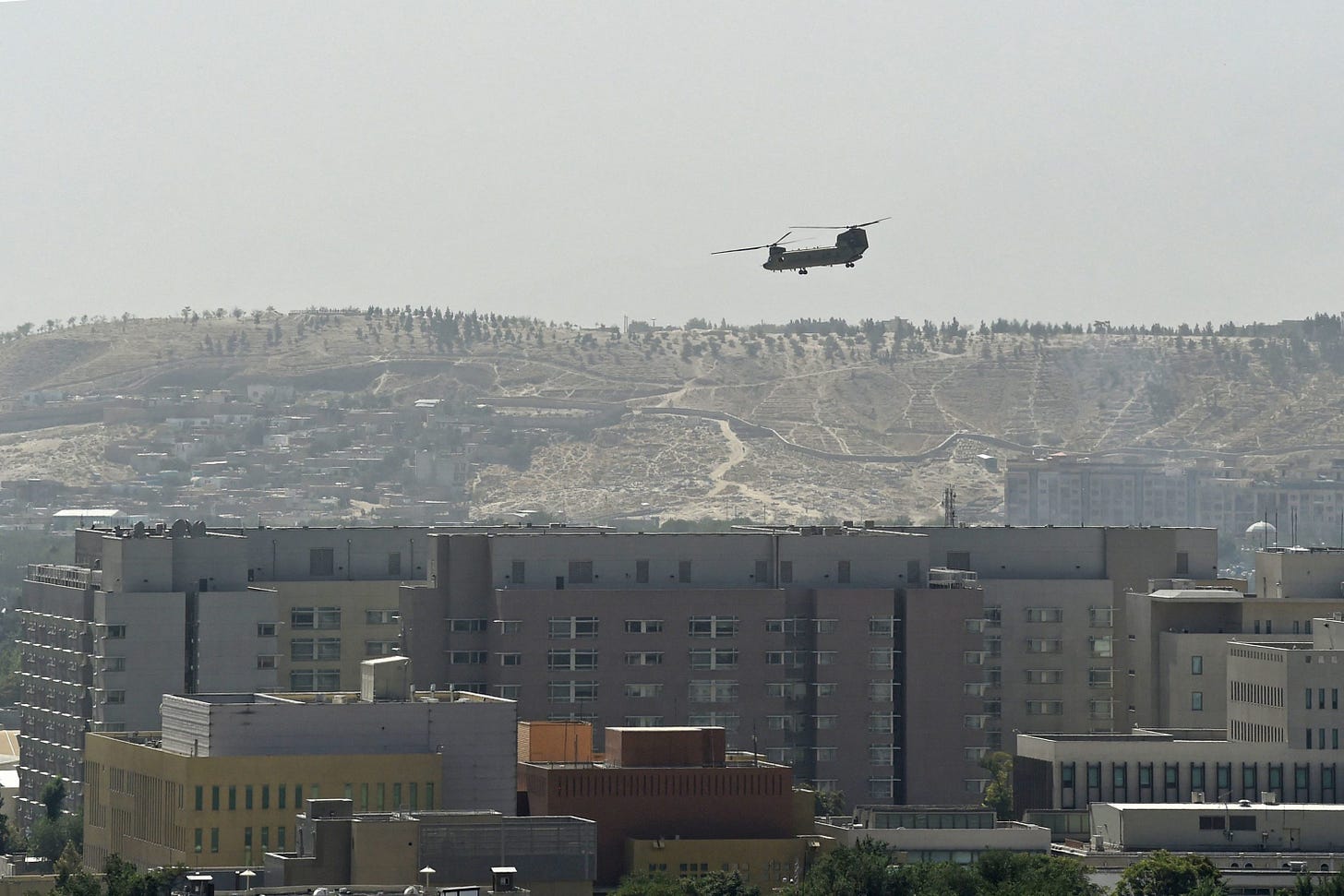Why the Afghan Army Fell to the Taliban
When the U.S. withdrawal was announced, logistical support evaporated.

President Joe Biden promised an orderly withdrawal from Afghanistan. Just last month, rejecting analogies with the fall of Saigon, he said, “There’s going to be no circumstance where you see people being lifted off the roof of an embassy in the—of the United States from Afghanistan.” Yet photos from Kabul this weekend look eerily like the fall of Saigon.
The Afghan National Army is getting a lot of blame for the Taliban’s swift takeover of the country. The United States spent the better part of two decades, and about $90 billion, supporting the Afghan National Defense and Security Forces, including the army. Yet they fell rapidly before the Taliban. Why?
In the coming days, we will likely learn more about how the army lost so badly—there are dark rumors of deals cut long ago with the Taliban, in addition to public remarks alluding to the military having to fight with its arms tied. But there are a few things that we can already say now. The Afghan military was not defeated because it was filled with cowards or fools. Afghans are good fighters, and the army had done a fine job in pushing back against the Taliban since 2014, when we transferred combat responsibility to them.
But in that 2014 handoff is an important part of the explanation for the Afghan army’s 2021 defeat. The deal put in place at the time was that the Afghans would do the fighting—and the dying—and the United States would provide logistical and air support.
War is not just fighting on the battlefield. Logistics are vitally important. More to the point, Americans trained the Afghans to fight as we do, not like the Afghans used to, so they became reliant on our methods, tactics, and equipment, including air support and a complex system of military units that requires an exhaustive command and communications network. While we may have had good intentions and good reasons for making the Afghans reliant on these tools and techniques, we never taught the Afghans how to do them on their own. We did them for the Afghans ourselves.
When, in April, President Biden abruptly announced our pending withdrawal, the American focus turned from logistical support to exit. On top of the 3,500 American members of the military, 17,000 more military contractors stopped assisting the Afghans more or less overnight. The Afghan military lost the equivalent of two logistics divisions, without the time to adjust to the new reality, learn how to supply itself with logistical support—something we never taught them—and teach itself how to operate complicated American machines and equipment, which takes months, if not longer, to learn. The American personnel didn’t even provide the courtesy of fixing the equipment they were leaving behind, much of it down due to maintenance issues. At that point, fighting was not courageous. It was reckless.
In the backrooms, Afghan military commanders immediately began to mitigate the situation to keep their heads—literally speaking. Out of fear for their lives and the lives of their loved ones, they started studying their options. Some chose to keep on fighting, a decision that might soon cost their lives; some planned their escapes; others pledged loyalty to the Taliban, either genuinely or out of fear.
President Biden is claiming that he had to stand by the agreement that Donald Trump’s secretary of state, Mike Pompeo, had made. Meanwhile, Pompeo is on a media tour to absolve himself and Trump of blame, even though a year ago he was on a media tour bragging that the Taliban would become America’s partners in counterterrorism against al Qaeda.
The reality is that, while Trump and Pompeo made this bed, Biden and Antony Blinken chose to sleep in it.
First, in 2020, Biden ran on the platform of I will undo everything Trump has done. Given that context, it is quite disingenuous of Biden to now claim that he is only executing Trump’s sacrosanct withdrawal policy.
Second, the first thing the Taliban did after signing the agreement with Pompeo was to violate it. Assaults on the Afghan National Army continued. Al Qaeda was never renounced. Common sense, international law, and morality would have all justified walking back from the deal, one that the Senate never ratified anyway. Quitting the deal would have relieved America’s allies and partners.
The Afghanistan War became the contractors’ war. The military loved it. Normally, the officers are held accountable and get in trouble for the screwups of their subordinates. But contractors don’t have that responsibility. The military senior leadership loved it because it didn’t stretch the military. And the politicians loved it. It saved them money and kept the numbers down so they could make the war sustainable for the long run. The contractor model came with all its countless flaws and a single benefit: It made the war durable—except that Trump and Biden did not care for it and wanted to wash their hands of it.









